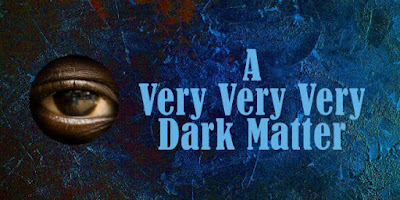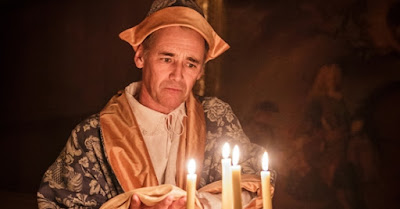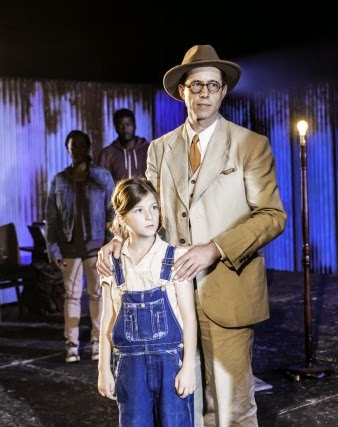Back in the New Yer, I heard that Tom Hiddleston, who I was fortunate enough to see live in Coriolanus at the Donmar theatre just over a year ago (as well, of course, as enjoying his performances on screen, including his wonderfully insane Loki in the Avengers film) was going to be appearing for a one-off 'in conversation with' evening at the Nuffield Theatre in Southampton.

The prospect of having to drive the (nearly) 2 hours home after the event was a little daunting, but not daunting enough to put me off booking, so last night, after a fun weekend with my sister and her husband, I arrived at the Nuffield ready to watch, listen and enjoy!
The theatre is a relatively small one (I think it seats around 450) and was almost full. I was fortunate enough to have tickets for Row D, which was the third row back, so had an excellent view.
Tom was interviewed by Sam Hodges, the theatre's director / CEO, who proved to be a good interviewer, willing to let his interviewee talk without interruption, and letting the interview develop as a conversation rather than a rigid set of questions, which was nice.
The event started a little late -it was closer to 7.15 than 7 when Tom came onto the stage, wearing a beautiful 3 piece suit and red tie. He immediately told us that he would be taking his jacket off, "if we didn't mind" (there was a round of applause which I think could be interpreted to mean that no-one would mind in the slightest)
Tom spoke about his passion for the theatre, and how important to him the connection between the actors and the audience is, and how he first felt how powerful this could be when he attended a performance of Ibsen's John Gabriel Borkman starring Paul Schofield, when he was about 14 years old. He described seeing how before the play, all of the audience members were talking and worrying about babysitters and work, and there came a point in the show where the whole audience were united, and forgetting those preconceptions. He also mentioned that on a personal level he doesn't really understand why people chose to drink before attending at the theatre, as why would you not want to be completely alert and focused on what is happening?
He described how he sees acting - quoting a mentor, he said that it is about telling the truth in imaginary situations. Tom was very clear that he feels he has an obligation (he used the word duty) to try to be as truthful as possible in portraying characters and their emotions, and that he would never want to look back on a performance and feel he could have done it better.
This led on to discussions as to favourite performance spaces, and the pleasure of spaces with good acoustics and the ability to feel that connection with the audience. Tom explained that this was particularly true in Coriolanus, when he could hear the gasps from the audience, and see people shrinking back lest they were spattered with his blood!
(He also explained that with a long run, there is always a challenge of trying to keep performances fresh, and that in Coriolanus, he would pick one of three possible entrances each night for his first entrance, so that the 3 actors playing the commons would be genuinely surprised,each night, not knowing where he would come from! )
Tom also talked about the process of acting - explaining that for his role as Loki, he spent days being filmed in ultra violet light by 160 cameras totally surrounding him, to register every different emotion, in order that this could then be used to put those expressions onto Loki's face in scenes (such as the Hulk smash ones) where Loki has to be created by CGI.
He confirmed that while he has great admiration for Daniel Day Lewis he doesn't consider himself to be a Method actor, he finds it more helpful to be able to discuss a character with the director, and to ask for input and make suggestions. (Although he did admit to staying in character to the extent of retaining the same voice/accent, when filming 'I Saw the Light' ). Did I mention that when Tom quotes what other people have said he uses their voices?
When Tom is quoting other people he uses their voices, so we heard Sir Anthony Hopkins (speaking about the way that people love dark and dangerous characters, even though they would run in terror were they to met those characters in real life, with reference to both Loki and Hannibal Lecter), and Rodney Crowell (who mentored Tom for 'I Saw the Light' . My words cannot do justice to the sight and sound of Tom Hiddleston, in his beautiful waistcoat and lovely natural accent,suddenly coming out with a pitch-perfect Southern accent! You will just have to imagine it (at least until the film comes out)
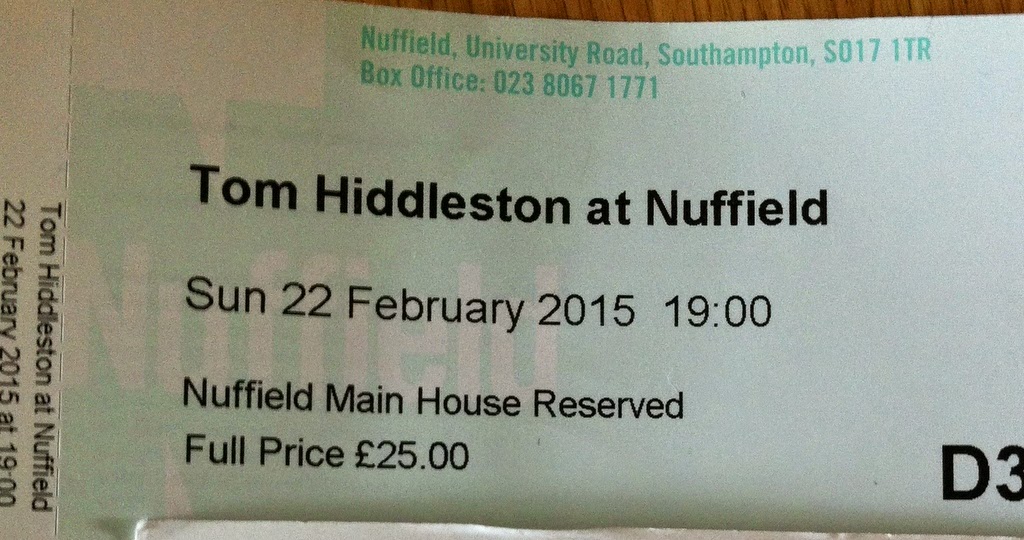
The interview also covered the issue of education and equality of access - Tom explained that when he attended Cambridge, and then RADA, he paid around £1,100 per year for tuition fees, but now the fees are around £10,000 per year. He did stress that there are various bursaries and scholarships available, and that he believes that actors and other people in the industry are very welcoming and egalitarian (which I guess is good for young actors once they have managed to get one foot in the door!)
The topic of Tom's support for 'He for She' came up, and he dealt with it very simply by explaining that for him, it is inconceivable, anathema, to think that women and men are not equally capable, and should not be equally treated, so there was every reason to lend his support, and no reason not to.
Tom talked about the various roles he has played, and why and how he chooses them. He explained that he feels there is a part of him in in each role, his determination and self-motivation in Coriolanus,for example, and his sense of mischief in Loki, and also the roles follow on from one another - the goodness and decency of Captain Nicholls in War Horse came as a contrast with the dark and 'damaged' character of Loki (and of course there was also the opportunity to lead a cavalry charge, which is not an opportunity which comes up every day!)
The majority of the evening was in the form of the interview / conversation between Tom and Sam, including some questions which had been sent in in advance by audience members.
At the very end there was about 10 minutes for audience questions. Sadly the first was someone trying to circumvent the very clear information about Tom being unable to stay to provide autographs, photos or a meet and greet, and to ask for an autograph but after that there were a couple of interesting questions.
One woman asked whether, following on from various women playing male roles, there were any female roles he would like to play, and mentioned her own wish to play Iago (he told her to go for it!) His response was to say he thought there needed to be more women taking on traditional male roles.
It was a fascinating evening, and gave a lot of insight into Tom's approach to his craft, which he clearly takes very seriously, and works extremely hard at, to be the very best he can be. I would love to know whether there were many drama students or aspiring actors in the audience, as I think that they would have found it illuminating, and helpful.
Oh, and did I mention the part where he offered one of the bottled of water from the stage to someone in the front row who seemed a bit hot and thirsty? (It was very hot in the theatre). Such a thoughtful chap!
We were not permitted to take photographs during the event, so I didn't, so here is a copy of one of the press pictures for 'Coriolanus' instead, because, well, why not?
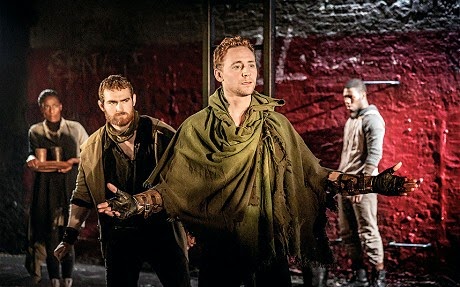
I shall be looking forward to seeing I Saw the Light when it comes out (Apparently, all of the singing and playing is Tom himself) and will keep my fingers crossed that he comes back to live theatre (and that I can get tickets) sooner rather than later.
I got home very late, but very happy!
